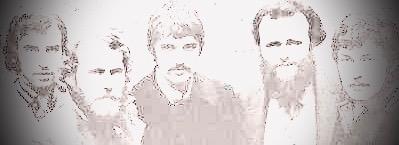A documentary can't cover everything; no time for that. If director Daniel Roher's reflection on The Band leaves keyboardist Garth Hudson a cipher, nearly ignores late bassist Rick Danko, paints drummer Levon Helm as an essential but troublesome malcontent, and consigns pianist Richard Manuel's 1986 suicide to the deep shadows, we can go elsewhere for more information on those guys. Kind of strange for a film about a musical brotherhood to leave the brothers themselves so undefined, but every window has its dimensions.
So let's focus on the perspectives Roher and producer Martin Scorsese do open, which naturally emphasize guitarist and primary songwriter Robbie Robertson, the only classic member of The Band not dead or silent.
We really begin to understand Robertson's obsession with the American South. Beaten by his mother's husband, young Robbie is highly motivated to get the hell out of Toronto, both physically and psychically. This self-possessed only child finds freedom in the wild antics of touring rockabilly singer Ronnie Hawkins, who also reinforced his connection to the Southern music of Elvis Presley, Carl Perkins and Muddy Waters that fed the Arkansas-raised Hawkins. Robbie relates a telling instance of singlemindedness, as he sells his precious Strat so he can travel to Fayetteville and audition for Hawkins. Needless to say, he gets the job. Arkansas-born Helm is already in the Hawks, and Robertson fills out the group with the other three Canadian members of what will become The Band.
Although many have wondered why a Canuck songwriter would turn to the American Civil War and old-time medicine shows for subject matter, we have to remember that Robbie is young enough -- 17 when he joined Hawkins -- to choose complete rebirth. Following up his musical predilections with tour experience and intimate sojourns in New Orleans, he chooses to become a Southerner, just as Hawkins is reinventing himself as a Canadian.
This is why The Band's music rings with such authenticity: Converts make the best believers. The conversion also explains The Band's biggest tension, between adoptive Southerner Robertson and native son Helm, demoted from leader of Levon and the Hawks to a shrinking voice within an ever-less-democratic democracy. Helm actually goes off to work on an oil station rather than remain in the band that backed Bob Dylan, saying he doesn't like their quirky new sound.
Robertson, though, knowing he needs that direct connection to the soil, asks Helm back, and the wisdom of that reunion shows in The Band's biggest hits -- Helm sings lead on "Rag Mama Rag," "Up on Cripple Creek" and "The Night They Drove Old Dixie Down." Not to mention Helm's drumming, which pulls Crescent City backbeat into the pop vocabulary and gives The Band its indelible signature.
"Brothers" extracts memories from contemporaries such as Hawkins, Taj Mahal, Eric Clapton, Bruce Springsteen and Van Morrison, with Robertson perhaps idealizing a moment when he is anointed by the Prophet Dylan himself. The Band's legendary chemistry is mythologized, and Robertson is enthroned as that rare group star who's not a main singer.
What rings as most important, though, is not Robertson's magnetism or talent, but his drive. The hippie era ranked inspiration over work, so here's another way The Band -- dressed in clothes from a century previous, tilling the earth of strangers and steering by their own lights -- stood apart. It's a miracle we ever heard a note from them, and anything we continue to hear has value.
* * *
"Once Were Brothers," whose theatrical run was cut short by the pandemic, is now rentable on Amazon.

